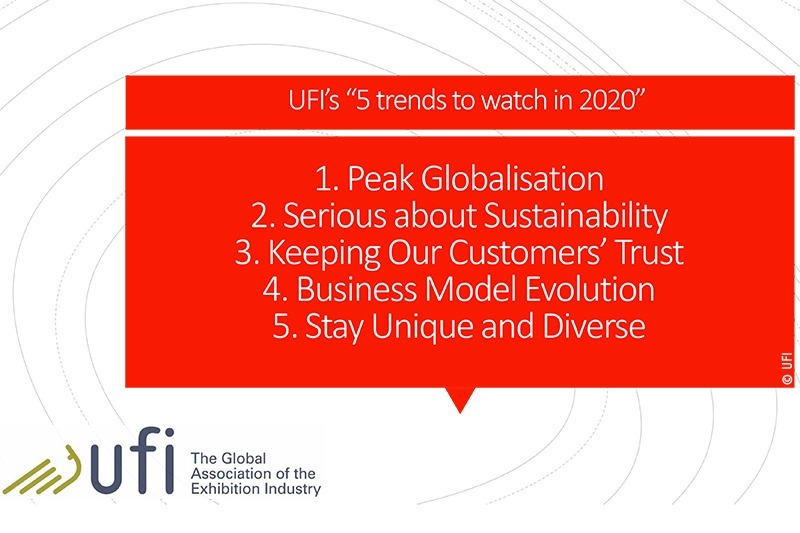
Against the backdrop of a slowdown in economic activity, protectionism and customs crises, the exhibition industry around the globe is asking itself what its medium-term prospects are. UFI, the Global Association of the Exhibition Industry, has published an outlook for 2020 which identifies five trends for the global trade fair industry.
With this new decade, the world seems to have become less stable and more disrupted in many aspects of life – in politics, in tech, in societies and in business.
As every year, UFI has been tracking developments in the exhibitions (and events) industry around the world at our own events, in numerous conversations and through many other channels. Here are our 5 trends that leaders in exhibitions and events in 2020 should all be watching out for:
1. Peak Globalisation?
The growth of the global economy is slowing. The US-China trade conflict is leaving its mark on the economy of both countries as well as on the rest of the world. In addition, political uncertainty is prevalent in many countries around the world marking a general trend towards protectionism. Some analysts are predicting that we are on the verge of reaching the peak of globalization, and with it the re-emergence of more regional trading patterns. The message for our globally connected industry is clear: balancing portfolios across regions and industries is primordial to remain successful in the years ahead.
2. Serious about sustainability
The discussion around sustainable development will continue to heat up, with every industry challenged to prove their tangible contributions to a more sustainable way of doing business. In 2019, we already saw weather-related show cancellations and delays in venue projects as temperatures became too hot for workers.
The related challenges for our industry are rooted in the big issues as well as in smaller actions. The good news is that, while we all can do much to implement best practices at every event we organise, on the whole exhibitions are and remain the most sustainable way of bringing all the players of an industry together.
3. Keeping our customers’ trust
There is an ever-increasing focus on customer centricity – driven by the trends of recent years to create more unique visitor experiences at events. This has many shapes and forms, but at the core is the need for our industry to remain a trusted partner by our customers.
A lot of this evolves around data and transparency at all customer touch points – from pricing policies to visitor numbers to ROI data. If indeed “data is the new oil,” then the data that we use to attract exhibitors and visitors and the data that we generate for them must be trustworthy and stand up to scrutiny. There are elements in our face-to-face business model that are very hard to translate into data fields, where we are reliant on narratives and customer success stories. It is what keeps our businesses resilient in times of digital disruption in the industries around us.
4. Business model evolution
Trade shows have become a blend of formats combining elements of the trade show floor with theatres for exhibitor presentations, with conference stages, with experiential programmes. The evolution of the business model is progressing and old “silos” of competencies between trade show and conference managers are disappearing.
A new, more diverse mix of industry leaders and hand-on teams is in the process of redefining the trade show experience. This is also leading to an ongoing review of business models and pricing models. In addition to the traditional “space sold” approach, new revenue streams are emerging.
5. Stay unique and diverse
As an industry, we are unique. Our daily task is to build platforms for entire industries to meet. Many new arrivals to our industry find it hugely valuable that we are an industry open to share, exchange, and collaborate. As new challenges arise, it is encouraging to see that this also drives the number of productive exchanges and collaborations. More diversity in leadership for diverse companies within our sector will drive the continued success of our industry as a whole.

By Kai Hattendorf, UFI CEO

